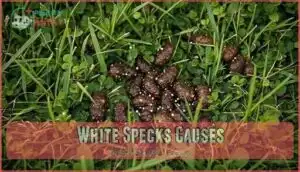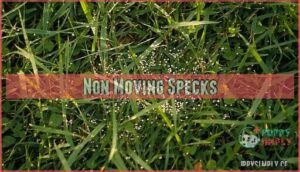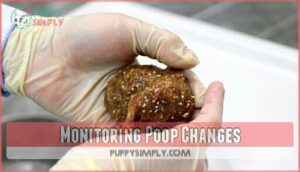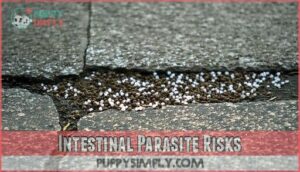This site is supported by our readers. We may earn a commission, at no cost to you, if you purchase through links.
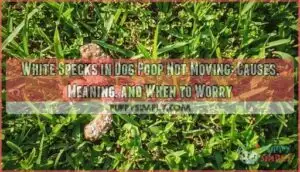
Your dog’s digestive system sometimes can’t fully break down certain foods like rice or calcium-rich items. Unlike parasite segments which typically wiggle, these non-moving white flecks usually aren’t cause for concern.
However, if they persist for several days despite dietary changes, or if your furry friend shows other symptoms like diarrhea or lethargy, it’s time to consult your vet. The right dietary adjustments might be all you need, and making these changes can help your dog return to normal health.
Table Of Contents
- Key Takeaways
- White Specks Causes
- Non Moving Specks
- Dog Poop Analysis
- Health Implications
- Preventing White Specks
- Vet Consultation
- Frequently Asked Questions (FAQs)
- What are the white specks in my dog’s poop that don’t move?
- What are white specks in stool not worms?
- What are the white seeds in my dog’s poop?
- What are the signs of a tapeworm infection in dogs?
- How can I prevent my dog from getting worms?
- Is it safe to give my dog praziquantel tablets?
- Can I still give my dog bones if they have worms?
- Can white specks indicate food allergies?
- Do antibiotics cause white specks?
- Are white specks related to liver disease?
- Conclusion
Key Takeaways
- Non-moving white specks in your dog’s poop are typically harmless and often result from undigested food, bone fragments from treats, or medication residue—not worms.
- You’ll want to monitor the specks for persistence (more than 2-3 days) and watch for accompanying symptoms like lethargy, diarrhea, or weight loss, which signal it’s time to consult your vet.
- You can prevent these specks by making dietary adjustments, ensuring proper fiber intake, maintaining adequate hydration, and considering digestive enzyme supplements if your dog has absorption issues.
- You should distinguish between non-moving specks (likely dietary) and rice-like segments that move (tapeworms), as the latter requires immediate veterinary treatment with deworming medication.
White Specks Causes
When you notice white specks in your dog’s poop that aren’t moving, several potential causes might explain it.
These can range from undigested food particles to harmless bone fragments or even residue from medications.
Undigested Food Particles
Your dog’s digestion isn’t perfect, and sometimes food breakdown falls short.
White specks in dog poop could just be undigested food like rice or corn. Fiber content in some foods resists dietary enzymes, leading to incomplete digestion.
Don’t fret—stool analysis often reveals harmless causes. Adjusting your dog’s diet might smooth things out—literally!
Keep an eye on consistent specks, though, and consider dietary enzymes and incomplete digestion as potential factors.
Bone Fragments
White specks in dog poop might just be bone fragments.
If your pup enjoys raw diets or chew toys, undigested bone can sneak through.
These specks are firm, irregular, and harmless unless stool turns entirely white.
Keep an eye on calcium levels, as too much can impact digestion.
Puppy poop often reflects dietary quirks—monitor changes and adjust if needed, to prevent issues related to digestion.
Foreign Objects
Sometimes, those white specks in dog poop might be from foreign objects your pup swallows—like bits of rope, toy stuffing, or even mulch.
Object ingestion can sneak by unnoticed until bowel obstruction becomes a real concern, possibly requiring surgical removal.
Regular dog poop analysis and monitoring symptoms help catch issues early, and preventative measures, like puppy-proofing, can save both stress and vet bills, which is a significant concern for many dog owners, and thus, regular monitoring is crucial.
Medication Residue
Medications can leave residue in stool if not fully absorbed. This can cause white specks in dog poop, often harmless but worth noting.
Here’s what might cause it:
- Unabsorbed drugs due to incorrect dosing.
- Visible excipients (inactive ingredients) from pills.
- Changes in medication affecting digestion.
- Residue toxicity if dosage impacts gut health.
Fungal Infections
Fungal infections like yeast overgrowth or Candida albicans can cause white specks in dog poop.
Symptoms might include fungal diarrhea or even skin involvement, like redness or itching.
A systemic mycoses infection could also leave clumps in stool.
If these signs persist, or your dog’s health seems off, it’s time to chat with your vet about fungal infections.
Non Moving Specks
When you notice non-moving white specks in your dog’s poop, it’s often a sign of dietary or digestive factors at play.
These specks can result from undigested food, malabsorption, or harmless remnants passing through their system, which can be related to digestive issues.
Malabsorption Issues
Poor nutrient absorption from malabsorption can lead to white specks in dog poop.
I’ll create a short, engaging blockquote in the same tone as the example paragraph about malabsorption:
When your dog’s digestive system struggles to absorb nutrients, those mysterious white specks in their poop might be sounding the alarm.
Conditions like enzyme deficiency, an imbalanced gut microbiome, or inflammatory bowel issues disrupt dog digestion, leaving undigested food in stool.
These white specks might signal trouble absorbing essential nutrients.
If your dog shows weight loss, lethargy, or unusual hunger despite normal eating, consult your vet about dietary management.
Dietary Factors
Certain dietary factors can explain non-moving white specks in dog poop.
Undigested food, like grains or fiber-heavy meals, may result from a sensitive stomach or grain sensitivity.
High calcium intake from certain foods can also show up white.
Raw diets, while trendy, occasionally cause undigested fragments.
It’s worth tracking your dog’s diet to spot potential food allergies or changes.
Sometimes, these specks can be attributed to excessive calcium intake from certain foods, such as excessive calcium intake, which may indicate sensitive stomach issues or grain sensitivity.
Intestinal Health
Your dog’s intestinal health plays a vital role in proper digestion.
When the gut microbiome is imbalanced, non-moving white specks in dog poop may appear due to incomplete nutrient absorption.
These digestive issues often stem from inflammation, infection, or enzyme deficiencies that hinder food breakdown.
Adding probiotics can restore beneficial bacteria, while digestive enzymes may improve processing of nutrients.
Regular dog stool analysis can help identify these problems before they worsen, ensuring the overall intestinal health of your dog.
Dog Poop Analysis
You’ll learn valuable information about your dog’s health by examining their poop for white specks, color changes, and consistency variations.
Regular monitoring of your dog’s waste can help you catch potential issues early, saving you worried glances at mysterious white flecks during your backyard cleanup duties, which involves checking for white specks and other signs of health issues, and this can be considered a part of regular monitoring.
Stool Color and Consistency
While non-moving white specks often indicate dietary issues, understanding your dog’s overall stool color and consistency provides valuable health insights.
Healthy dog poop is typically medium brown and firm but not hard. Diet impact shows through color variations—lighter from bone-heavy diets, darker from organ meats.
Digestive health problems might present as clay-colored (bile production issues) or black stools. Examining dog poop shades can offer further clues about a dog’s health.
Proper hydration levels guarantee ideal poop consistency, neither too dry nor too runny, which is crucial for maintaining your dog’s overall health and well-being.
Monitoring Poop Changes
Why should you become a poop detective for your furry friend? Regular monitoring helps catch health issues early before they become serious problems.
- Track poop consistency changes from firm to loose or watery
- Note color variations that differ from normal brown
- Record frequency tracking and volume changes over time
- Monitor odor alterations that seem unusual or particularly foul
Keeping a simple "poop diary" might sound gross, but it’s invaluable for spotting patterns your vet would want to know about. Consider a thorough stool examination for detailed insights.
Identifying Non Moving Specks
After tracking changes in your dog’s stool, it’s time to examine those non-moving white specks more closely.
When performing a dog poop examination, note the speck size and texture.
Tiny rice-like particles often indicate diet correlation, while larger chunks might be bone fragments.
Fresh vs old samples matter too—fresh specimens yield more accurate vet analysis.
Consider comprehensive stool testing for detailed insights.
Take clear photos of concerning dog poop white specks to show your veterinarian during a dog fecal exam.
Health Implications
You’ll need to understand the health implications of white specks in your dog’s poop to determine if it’s cause for concern.
Those non-moving white spots might indicate digestive issues like malabsorption or fungal infections, rather than just undigested food passing through your furry friend’s system.
This understanding is crucial for identifying potential digestive issues early on.
Malabsorption Symptoms
Now that you understand how to analyze your dog’s poop, let’s look at what malabsorption symptoms might tell you about those white specks.
If your dog has malabsorption issues, you’ll notice more than just white specks in dog poop.
Watch for:
- A once-chunky Lab suddenly becoming a canine supermodel (unexpected weight loss)
- A pup who snoozes through playtime (decreased energy levels)
- A dog who’s constantly begging despite regular meals (increased appetite)
Fungal Infection Signs
Sometimes, white specks in dog poop point to fungal infections, like yeast or candida.
Watch for symptoms such as coughing, fever, weight loss, or a foul odor. Skin symptoms, like redness or sores, can also appear.
These dog poop abnormalities often tie back to gut health. One potential source of fungal issues can be from dogs consuming wild mushrooms, so supervising dogs during walks is essential.
If your dog shows these issues, a vet visit is smart.
Intestinal Parasite Risks
While fungal infections cause concern, intestinal parasites present their own set of risks.
Even non-moving white specks might indicate remnants of dead worms. Your dog’s exposure to environmental contamination increases parasite risks substantially.
Fleas carrying tapeworms can easily infect your pup, showing up as rice-like particles in dog poop. Many dog intestinal parasites have zoonotic potential, meaning they can spread to humans.
Consistent worm prevention, including heartworm medication, protects both your pet and family, which is crucial for maintaining a healthy environment and preventing the spread of parasites with zoonotic capabilities.
Preventing White Specks
You can prevent those mysterious white specks in your dog’s poop by making simple dietary adjustments and maintaining regular parasite prevention measures.
Consistent veterinary checkups will also help identify potential digestive issues before they become visible in your furry friend’s stool, which can be achieved through simple dietary adjustments and regular maintenance.
Dietary Adjustments
To help eliminate white specks in your dog’s stool, focus on balancing their diet with proper fiber intake. If you’re noticing digestive issues, try slowly switching to easily digestible foods and monitor for potential food allergies.
Focus on balanced fiber intake and easily digestible foods to eliminate those pesky white specks in your dog’s stool effectively!
Consider the pros and cons of raw feeding versus commercial options. Proper supplementation can support gut health, while maintaining adequate hydration levels helps process food effectively.
Multivitamins and minerals may help fill nutritional gaps in your dog’s diet. Rice and certain grains can be beneficial for some dogs with sensitive digestion.
Regular Vet Checkups
In conjunction with monitoring your dog’s poop, regular vet checkups are your best defense against health issues.
Schedule bi-annual visits for preventative care and early detection of problems that might cause white specks in stool.
Your vet provides expert advice on vaccination schedules and health monitoring specific to your dog’s needs.
These checkups catch digestive problems before they become serious—think of them as your dog’s wellness tune-ups to ensure overall health, and they are crucial for early detection of potential issues.
Parasite Prevention Measures
Several parasite prevention measures can eliminate those worrisome white specks in your dog’s stool. Implementing a consistent protection plan is your best defense.
- Maintain a strict deworming schedule with broad-spectrum medications
- Practice thorough flea control to prevent tapeworm infections
- Establish good hygiene practices like prompt poop cleanup
- Consider diet impact by avoiding raw foods that may harbor parasites
- Administer monthly preventative medication that targets multiple parasites, as part of a broader strategy for parasite prevention.
Vet Consultation
You’ll need a vet’s opinion if those white specks persist in your dog’s poop despite dietary changes or if they’re accompanied by symptoms like lethargy or weight loss.
Your veterinarian can perform specialized tests to determine if the specks are caused by intestinal issues, malabsorption problems, or other health concerns that aren’t related to parasites, which can help identify the underlying cause of the intestinal issues.
When to Consult a Vet
Noticing persistent specks in your dog’s poop means it’s time for veterinary consultation.
Contact your vet if white specks remain for more than two days, especially with accompanying symptoms like diarrhea, vomiting, or behavioral changes.
Don’t wait if your dog shows lethargy or appetite loss – these signal diagnostic urgency.
Regular preventative care helps catch these issues early, but immobile white specks paired with concerning symptoms always warrant immediate veterinary attention.
Diagnostic Tests
Your veterinarian’s diagnostic toolbox includes several tests when investigating non-moving white specks.
Fecal exams reveal parasites and undigested materials, while blood work checks for underlying health issues.
In persistent cases, your vet might recommend imaging techniques to examine the digestive tract, biopsy analysis to check for tissue abnormalities, or culture tests to identify bacterial infections.
Regular stool analysis catches problems early, turning your dog’s poop into a valuable diagnostic window.
Treatment Options for Non Worm White Specks
Treatment options for non-worm white specks will depend on your dog’s specific diagnosis.
- Dietary adjustments often resolve undigested food particles within 2-3 weeks
- Enzyme supplements support better nutrient absorption for dogs with digestive difficulties
- Probiotic therapy can restore healthy gut flora when immobile white specks persist
- Antifungal meds may be prescribed if fungal infections are causing those mysterious white spots
Your vet might also recommend symptom management while addressing the underlying issue.
Sometimes, excessive calcium intake can lead to chalky, crumbly white specks, which may require special care to resolve, and it’s essential to follow the vet’s advice for proper treatment.
Frequently Asked Questions (FAQs)
What are the white specks in my dog’s poop that don’t move?
The proof is in the pudding – those non-moving white specks in your dog’s poop are likely undigested food particles, bone fragments, medication residue, or fungal infections, rather than worms.
Monitor for other symptoms.
What are white specks in stool not worms?
White specks in your dog’s poop could be undigested food particles, bone fragments, medication residue, rice grains, or fungal infections.
They’re often harmless dietary remnants, but persistent specks may warrant a vet visit to check for potential infections.
What are the white seeds in my dog’s poop?
Those tiny, stationary seeds in your dog’s poop are likely undigested food particles, bone fragments from chews, or medication residue.
They’re usually harmless, but consult your vet if they persist alongside other symptoms.
What are the signs of a tapeworm infection in dogs?
You’ll notice rice-like segments in your dog’s poop, along with weight loss, scooting, and itchy rear. Your dog might also experience vomiting, diarrhea, or increased appetite despite losing weight.
How can I prevent my dog from getting worms?
Like building a fortress around your furry friend, you’ll need regular deworming treatments, monthly preventatives, proper waste cleanup, flea control, and regular vet checkups to keep those pesky parasites at bay.
Is it safe to give my dog praziquantel tablets?
Praziquantel is generally safe for dogs when prescribed by your vet. You’ll need the correct dosage based on your dog’s weight. Don’t self-medicate, as improper dosing can cause side effects.
Can I still give my dog bones if they have worms?
It’s best to avoid giving your dog bones while they’ve worms.
Wait until treatment is complete.
Bones can irritate the digestive system and potentially complicate the worm infection. Stick with regular food meanwhile.
Can white specks indicate food allergies?
Like detectives finding clues, white specks can sometimes indicate food allergies in your dog.
They’re often undigested food particles that appear when your dog’s system can’t properly process certain ingredients they’re sensitive to, which can be a clear sign of an issue related to sensitive ingredients.
Do antibiotics cause white specks?
Certain antibiotics can appear as white specks in your dog’s poop.
They don’t always fully dissolve in the digestive system and may pass through, showing up as small white particles in their stool.
Are white specks related to liver disease?
Like a warning light on your car’s dashboard, white specks in dog poop can indeed signal liver disease.
When your dog’s liver isn’t functioning properly, bile production changes, potentially causing visible white specks in their stool.
Conclusion
Spotting white specks in dog poop not moving can be like finding puzzle pieces to your pet’s health story.
Remember, these static specks often aren’t worms but undigested food or medication residue.
Monitor changes in your dog’s stool and overall behavior. If white specks persist despite dietary adjustments, or if your pup shows additional symptoms, don’t hesitate to consult your vet.
With proper care and attention, those mysterious white specks in dog poop not moving will soon be a thing of the past, and you can ensure your pet’s health is back on track with proper care and attention.

